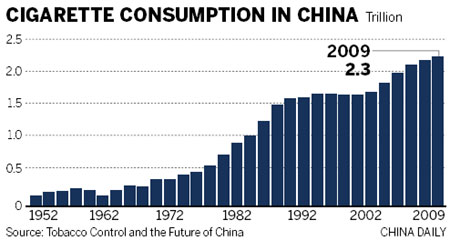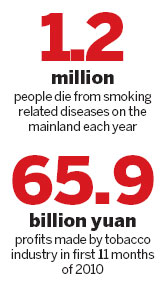China
Report: Smoking industry harming economic health
By Shan Juan (China Daily)
Updated: 2011-01-07 07:38
 |
Large Medium Small |


Cost of addiction rising as experts seek efforts to eradicate it
BEIJING - Lost productivity from smoking-related health problems will hamper China's economic growth, and related costs incurred by smoking far exceed the tobacco industry's contribution in terms of profits and jobs it generates, an international panel of experts warned on Thursday.
They also warned that China's addiction to huge revenues from the State-owned tobacco monopoly is hindering anti-smoking measures, potentially costing millions of lives in the country with the world's largest number of smokers.
The warnings, issued in a report prepared by a group of prominent public health experts and economists, came amid growing calls for the government to give stronger support to tobacco-control measures.
"As the health impact of smoking, including rising heart disease and lung cancer, gradually emerges, unless there is effective government intervention, it will affect China's overall economic growth due to lost productivity," said Yang Gonghuan, deputy director of the Chinese Center for Disease Control and Prevention.
She is also lead author of the report, Tobacco Control and the Future of China, which involved the efforts of 60 experts.
The report attempts to quantify the financial cost to China of smoking. Last year, it cost 61.8 billion yuan ($9.3 billion) more to treat people for smoking-related illnesses and deal with tobacco-related issues such as pollution, than the tobacco industry generated in profits and jobs created, Yang said.
Official data released last month said the tobacco industry made 65.9 billion yuan in profits in the first 11 months of last year, 6.3 percent higher than the previous year.
China is the world's largest tobacco producing and consuming country, with more than 300 million smokers on the mainland, official statistics showed.
Each year, about 1.2 million people die from smoking-related diseases on the mainland and the figure will increase to 3.5 million by 2030, according to estimates from the World Health Organization (WHO).
The report underscores increasing concern that the country's economic potential will be jeopardized due to escalating medical costs and lost productivity if the government fails to take serious action to combat smoking.
"The report comes at a crucial time in China's battle against smoking," said Xu Guihua, deputy director of the Chinese Association on Tobacco Control.
The report was released days ahead of a Sunday deadline that China will fail to meet as a member of WHO's Framework Convention on Tobacco Control (FCTC). Measures to be taken before the deadline include banning smoking in public indoor venues as well as a total ban on tobacco-related advertising and sponsorship, Xu said.
The FCTC took effect in China on Jan 9, 2006 as a binding law after being ratified by the Standing Committee of the National People's Congress. But a huge gap exists between China's overall tobacco control and the FCTC's requirements, the report said.
The number of smokers dropped by 0.45 percent annually between 2003 and 2010, compared to 0.9 percent between 1996 and 2002, it said.
Cigarette consumption has seen steady and robust growth, from 589.9 billion in 1978 to about 2.3 trillion in 2009, a year that saw China fail to meet an FCTC deadline on printing warning graphics instead of just slogans on packets of cigarettes.
Hu An'gang, director of Tsinghua University's Center for China Studies, called the tobacco industry's obstruction "the prime culprit" behind the failed anti-smoking efforts.
The report highlighted a conflict of interest concerning the State monopoly over the tobacco industry.
The State Tobacco Monopoly Administration is under the Ministry of Industry and Information Technology, the agency in charge of the government-initiated tobacco control campaign. This setup allows the tobacco industry to use the government's authority to promote tobacco production and sales, impede adoption and implementation of tobacco control policies and laws, and publicly conduct activities undermining FCTC implementation, such as marketing tobacco brands in the name of charity, said the report.
Currently, the tobacco industry employs roughly 10 million people and generates more than 7.5 percent of total government revenues, official statistics showed.
"That undermines China's fundamental goal for sustainable social and economic development as well as people's basic right to health," said Zhi Xiuyi, director of the Lung Cancer Treatment Center of Capital Medical University.
"Considering the long-term benefits, the Chinese government should work harder to prevent more deaths from smoking. It's a major health and economic issue for the nation," said Jeffrey Koplan, vice-president for global health at the Georgia-based Emory University in the US.
He also urged national legislation on smoking control in China.
The central government should establish a tobacco control bureau under the National Development and Reform Commission to lead China's battle against tobacco, replacing the current Ministry of Industry and Information Technology, the report said.
China Daily